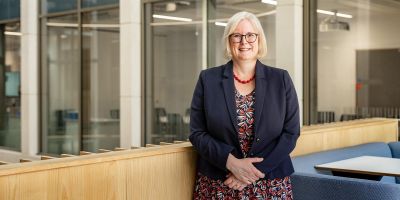Remembering Professor Ian Robertson

Colleagues will be saddened to hear of the death of Professor Ian Robertson, the Centenary Chair in Microwave and Millimetre-Wave Circuits in the School of Electronic and Electrical Engineering.
The following tribute has been contributed by Professor Robert Kelsall, Dr Craig Evans, Dr Roland Clarke, Dr Nutapong Somjit, Dr Des McLernon and Professor Robert Richardson.
Ian joined the University of Leeds in 2004, having previously been appointed as Professor of Microwave Subsystems Engineering at the University of Surrey, where he formed the Microwave Systems Research Group and was a founder member of the Advanced Technology Institute. Prior to that, Ian held academic posts at Kings College London (where he also studied for both his BSc (Eng) and PhD degrees) and worked in the electronics industry at the (then) Plessey Research Laboratories in Caswell.
Ian brought to Leeds an enthusiasm for microwave electronics, for electronics systems in general, and for teaching. He was always keen to make our courses interesting for students, and to highlight the industrial and practical relevance of electronics. He soon created a first year module in “Consumer Electronics”, in which students dismantled electronic products to see how they were made (which is, of course, how most of us got interested in electronics in the first place!). Ian loved electronic “gadgets” and was always looking for ways to incorporate them into teaching. Inspired by a magazine article, he set up a circular array of 24 loudspeakers which he encouraged various groups of students to use for creative, highly esoteric final year projects.
With this enthusiasm, it was perhaps inevitable that Ian was persuaded into the role of Director of Student Education (2006-11). Ian was a visionary and this role gave him the opportunity to put into practice some of his ideas about the future of electronics education. He was well “ahead of the game” in using “digital” technologies to enhance learning: his quest was always to find ways of making learning more interesting and engaging for students. Ian’s version of the “student voice” was very simple: regular chats with students, catalysed by free food and drink, to hear from them how we could improve their degree course! Ian also championed the incorporation of ethics into engineering teaching, which is now a standard aspect of engineering programmes nationwide.
Five years later Ian was appointed as Head of School (2011-16), where his long-sightedness was essential in seeing the emerging prominence of robotics and its crucial place in the School at a time when interest in electronics was dwindling. Ian was totally committed to securing the best interests of the School, its staff and its students. If his own interests featured at all, they were very much at the bottom of that list. While he was dedicated to leading the School professionally, Ian was also well known for his sense of humour and for not taking himself too seriously. Many Christmas parties and School social events saw “Professor Robertson” don a not-so-serious outfit to add some light-hearted fun, to the delight of both staff and students.
Alongside these major leadership roles, Ian maintained a strong research profile, publishing three books and over 400 peer-reviewed papers. He was elected Fellow of the IEEE in 2012 and appointed Chair of the General Technical Programme Committee for the European Microwave Week in 2011 and 2016.
Emerging from the Head of School role, he recognised that microwave research had “moved on” and was eager to apply his design and analytical skills to new challenges that captured his interest, including robotics and sustainable systems.
One of Ian’s strengths was not to get stuck in an unquestioning acceptance of the status quo – he was always prepared to challenge the orthodoxy and instead of asking “why?” he would often say “why not?” He spontaneously bought a mobile robot and contacted colleagues to see what could be done with it – in typical Ian style, “just get things going and see what happens”. As was often the case, Ian’s “shot-in-the-dark” led to long and fruitful academic quests with colleagues from Mechanical and Civil Engineering and Computing. The team won a large equipment grant that transformed Robotics research at Leeds, followed by major grants to create self-repairing cities and then robots inside pipes (‘Pipebots’). Over the last year Ian led the integration of software, sensors and mechanical elements of ‘Pipebots’ from universities across the UK towards an amazingly successful finale event commended by the UK research council.
Ian was a man who was always there for colleagues and ready to help to make their working life easier. During a recent conversation over coffee, he thought back on his career, the students that had gone on to great things, the successful research grants – the ones that weren’t successful, and the people that had made a difference. On his reflection, through all the twists and turns of his inspirational and impactful career, he said he came to realise that the most important thing is family. We think that is how Ian would want to be remembered: a family man as well as a true academic who cut through the peripherals to the things that really matter.




